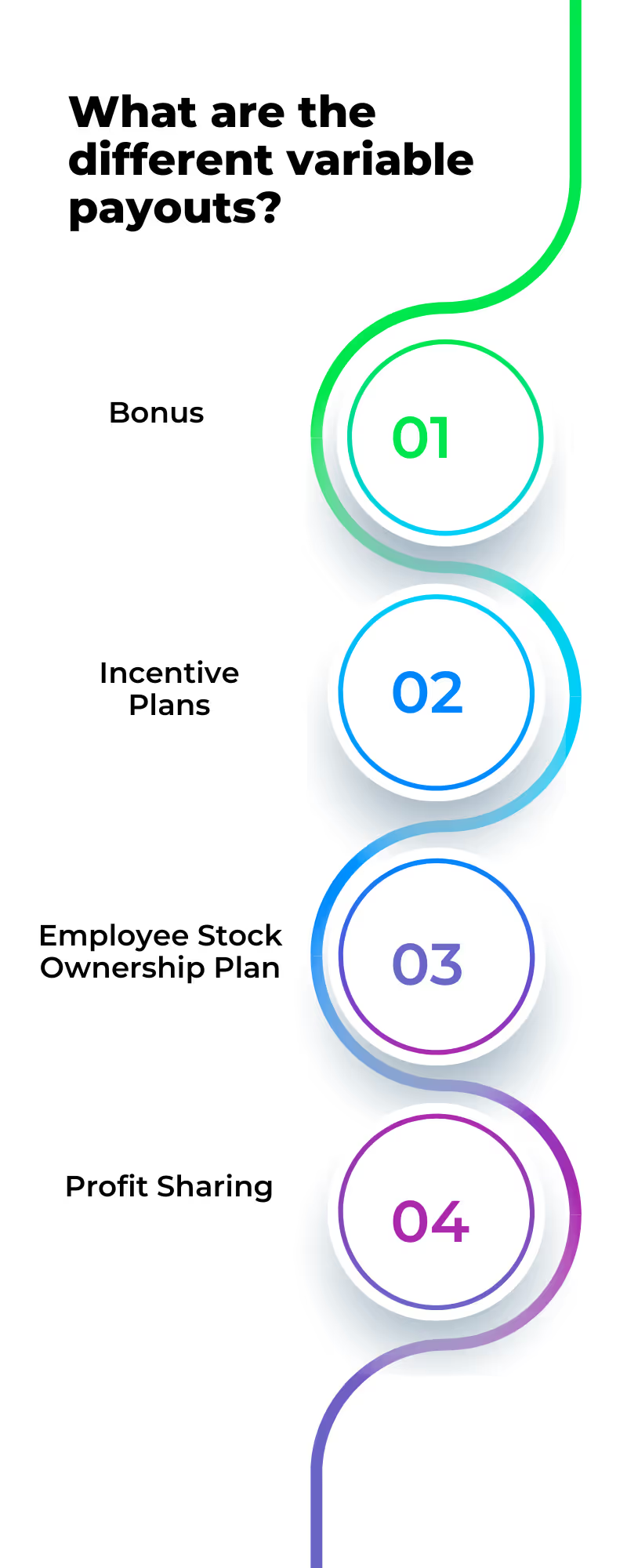
Blog
Variable Pay Explained: How it Works and Why it Matters
May 8, 2023


Key Insights
Is there a best way to ensure employee motivation, engagement, and productivity, all with a single tool?
Well, the answer is incentive compensation!
Surely, everyone in the sales world is well aware of the term. But do you realize the potential of variable pay in your salary structure?
This article gives you that holistic idea you were looking for about variable pay, its various types, its difference from a fixed salary, and the advantages and disadvantages of incorporating a variable pay in your salary.
So scroll down for all that information and more.
What is variable pay?
Variable pay refers to the changing amount in a salesperson’s salary depending on their performance. It can be in the form of incentives, bonuses, and other benefits that motivate the employee to improve their performance consistently.
The variable pay calculation is dependent on the organization’s policy and budget. For example, a company provides 10% of any sales as variable pay to their salesforce. If the sales go beyond $10,000 they will receive 12% as variable pay and above $20,000 will receive 15%.
Therefore, depending on the sales that the executive brings to the company, their gross salary also varies.
What are the different variable payouts?

What percentage of the sales a salesperson receives is dependent on their position, experience, and performance history. Depending upon these factors, here are a few variable pays the salesforce is entitled to.
- Bonus
Bonuses are an extra sum of money given to employees in addition to their fixed salary as a reward for good performance and to motivate them to consistently perform.
- Incentive Plans
An incentive is a fixed percentage of the sales that the salesperson has brought for the company. These are rewards given on a long-term basis like quarterly or yearly depending on their performance during the period.

- Employee Stock Ownership Plan
Apart from cash compensations, employees are also eligible for incentives in the form of stock ownership of their company as rewards for their performance.
- Profit Sharing
Incentives can be calculated in various ways. In the profit-sharing scheme, a salesperson receives a percentage of the profit that the company made in a period.
Difference between Fixed Pay and Variable Pay

As mentioned above, the salesforce salary is constituted of two parts: the fixed salary and the variable salary.
Fixed salary+Variable pay= Gross salary
And the way these two components are calculated determines a salesperson's salary.
- A fixed salary is the predetermined amount that is paid to the employee regardless of his performance. While the variable salary is dependent on the sales and performance of the employee. For example, a salesperson has a fixed salary of $5,000. Their gross salary can only be $ 5,000 and above depending on their achievements.
- Variable pay is influenced by sales quotas and targets. Only upon achieving it will the salesperson be eligible for the salary. A fixed salary is independent of any factors and will be credited to their account regardless of getting the work done.
- A salesperson receives his fixed salary every month but will get their incentives paid only on a quarterly or yearly basis.
- Depending on their performance, a salesperson can earn a variable salary higher than a fixed one. But a fixed salary is the sure amount that gets credited regularly.
Advantages and Disadvantages of Variable Pay
The possibilities of incorporating a variable pay system in your operations are immense, but it must also be added that it is not without drawbacks.
So let's explore what these possibilities and setbacks are.
Advantages
- The variable component in the salesperson’s salary motivates them to perform well and ensures that competence and productivity are kept high consistently, ultimately contributing to achieving their on-target earnings.
- A self-assured salesperson has the potential to earn more than their fixed salary and therefore offer bigger opportunities for growth and success.
- Variable pay can derive desired behavior from the salesperson as well as make them feel rewarded for their efforts and achievements.
- Providing incentives to employees will ensure employee engagement and retention as they are satisfied with their pay structure.
Disadvantages
- Variable compensation is prone to a lot of risks as it is heavily dependent on several factors including market status, sales volume, incentive calculation, etc.
- Most companies do not have a standardized procedure to calculate their incentives, hence not compensating the salespersons enough for the effort they put in.
- Improper calculation of variable pay can add up to a large amount that further causes loss for the company.
- A lack of proper knowledge of the potential of variable pay and its calculation can cause heavy prices for the organization without providing the desired outcomes.
These disadvantages can be overcome when organizations that incorporate variable pay in their employee salary structure understand the importance of automation of incentive calculation.
Digital solutions that track incentive compensation management and provide sales performance management make the whole process effortless and transparent. Automation of variable pay calculation helps prevent organizational losses in the form of money, resources, and manpower.
Kennect offers the most simplified sales incentive compensation management software built to automate your sales operations and maximize sales ROI. To learn more, Book A Demo TODAY!
Read More
What is variable sales compensation?
Basics of Sales Incentive Compensation
ReKennect : Stay ahead of the curve!
Subscribe to our bi-weekly newsletter packed with latest trends and insights on incentives.
Thank you! Your submission has been received!
Oops! Something went wrong while submitting the form.
Your data is in safe hands. Check out our Privacy policy for more info















